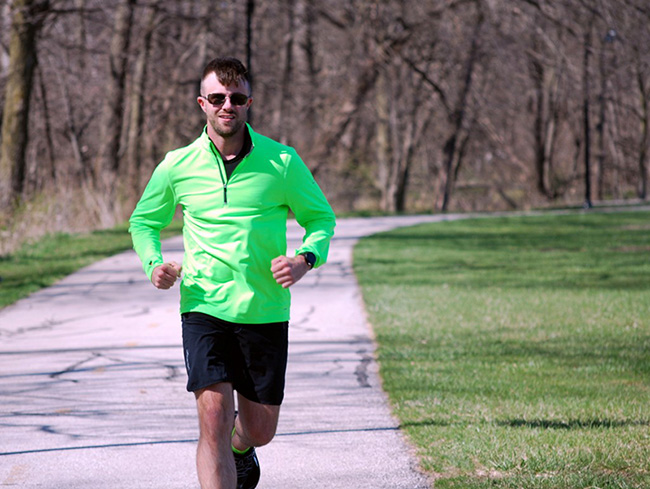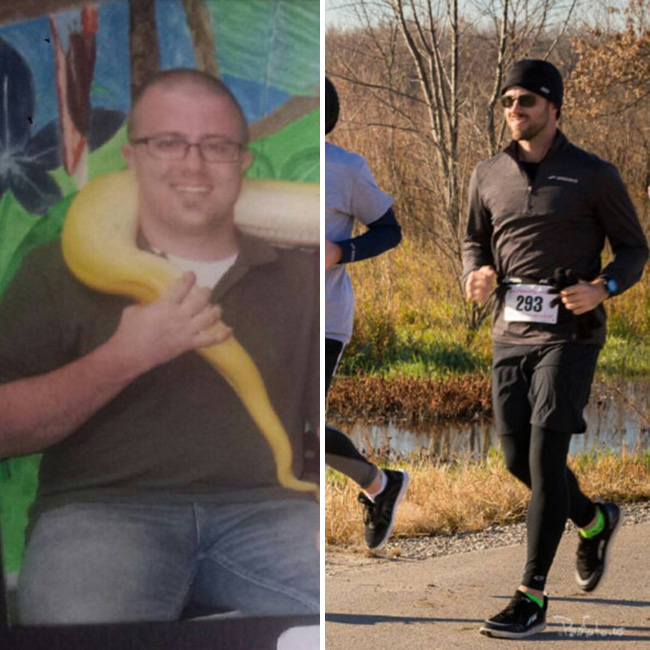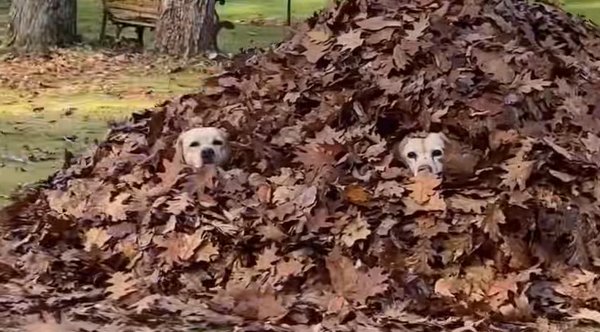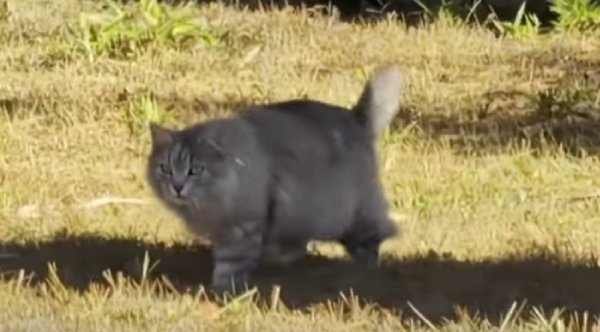Our Society Fundamentally Misunderstands The Role Of Exercise. We've Learned To Hate What We Love
April 20, 2016
Written by Frank Beard for FrankBeard.org
Even though most people in this country are overweight or obese, I constantly felt pressured to change when I was fat.

via FrankBeard.org
I'm not just talking about the scornful looks from folks in public, or the occasional comment from my mom about my health. It was more subtle than that. There's a pervasive, generally unspoken message that comes from movies, television, advertisements, video games–everywhere, really.
Have you noticed that the fat guy, for example, rarely "gets the girl" or plays the leading role in anything other than comedies?
"Well why would he?" you might ask. "She's probably not attracted to him–seeing as he's obviously let himself go. And he'd look silly dressed as Spider-Man."
But that's exactly it!
As a fat person, you get the message loud and clear: what you are, what you look like, everything about you, it's not okay. The people on the screens who go for adventures, fall in love, save the world–they aren't like you. They're better. Thinner. But you can play a supporting role as someone else's comedic relief or prissy friend, if you want.
That was never good enough for me. I hated being fat. I thought of myself as the thin, athletic guy that I was back in high school; but whenever I looked in the mirror, the damn thing showed me the wrong person. And when I went shopping, anything under size 40 to 42 was too tight. I wore dark colors to hide my bulging midsection, tugged on the bottom of my shirt whenever I stood up, and sucked in my stomach if an attractive woman was nearby.
I knew I needed to change.
But there's another message that was targeted at me: one which says "exercise will make you lose weight." You see thin people walking around in their gym clothes; see the advertisements that feature models running, cycling, lifting weights, doing whatever; and you flip through the channels only to hear Jillian Michaels or some other snake-oil salesman hawking diet pills or shouting like a drill sergeant to work harder and sweat off that weight. I later learned that weight loss begins and ends in the kitchen, but I didn't know this at the time.
So I tried running.
There's a one-mile stretch of road near my mother's house with a good hill at the end. It seemed like a reasonable place to start: sparse traffic, no other runners, no threats of people staring or watching. I laced up a pair of running shoes I purchased a few years earlier, put on some baggy gym shorts and an oversized, cotton t-shirt, and began the first day of my new life.
Or at least that's what I thought it was going to be.
After about twenty seconds, I had to stop and catch my breath. My sides ached as if my lungs had been torn open, sweat poured down my face, and my legs felt weak and rubbery. My entire body felt slow. Heavy.
I was dumbfounded. I used to run back in high school to stay in shape for wrestling and motocross racing, and during my first year with Teach For America, I ran around the track at the gym in-between racquetball games. I'd gained a lot of weight, had a few too many drinks, and spent a lot of time in front of a screen, but still…it wasn't supposed it be like that.
I toughed it out and made it back home. And to my credit, I did continue to run on and off for a few more weeks. But one missed day turned into two, and before I knew it, three or four weeks had gone by without doing anything.
And once you've waited that long, what's one more day, right?
Rediscovering Running

via FrankBeard.org
Fast forward to the present, and I run almost every day. If I didn't have to worry about overuse injuries, then I'd run even more.
So what changed?
Did I suddenly develop an ironclad willpower? Did I stop being a baby and learn to tough it out? Did I hire a personal trainer who kept me accountable?
Of course not. What changed is that I started having fun.
When I run, it's the highlight of my day. I'm out in nature listening to the chirping of the birds, the rustling of the leaves on the trees, and the synchronization of my footfalls and breathing. I'm alone, in solitude. Just me and my thoughts as I move the way my body evolved to move. Past regrets and future concerns disappear as I focus on that next step, that next hill or descent, right here, right now.
But I had no idea that running could be like this. I thought it was just something people did to manage their weight, and it was only after I discovered the joy in cycling that I was able to return to running with a new perspective.
But that's the problem. Our society fundamentally misunderstands the role of exercise. We believe that it's a drudgerous, self-flagellating activity to be endured in order to get that "beach body" or stay healthy. The idea that it can be fun, that it can be something more than struggle and exertion – it's conspicuously absent from the mainstream narrative.
Just look at the design of our gyms. Why are there so many televisions? Most of the machines in the cardio rooms are pointed right at them and have little headphone ports so you can zone out. The idea is that exercise can't possibly be enjoyable enough in-and-of itself.
We even have a name for this: working out. The emphasis, of course, is on the word work.
Alan Watts described this situation perfectly:
"It is a very nice thing to run and go dancing across the hills at a fast speed, but we see these joggers shaking their bones, rattling their brains, and running on their heels. There is a grimness about it because it is so determinately good for you."
I see this all the time at Gray's Lake in Des Moines: new runners pounding the ground with a low cadence, grunting as they battle fatigue and shortness of breath. Headphones jammed into their ears and cords dangling in the breeze.
"This is good for me, this is good for me, this is good for me," I imagine them saying.
But they look miserable.
Dr. Yoni Freedhoff often says that we need to rebrand exercise. As mentioned on his blog, Weighty Matters:
"By preventing cancers, improving blood pressure, cholesterol and sugar, bolstering sleep, attention, energy and mood, and doing so much more, exercise has indisputably proven itself to be the world's best drug – better than any pharmaceutical product any physician could ever prescribe. Sadly though, exercise is not a weight loss drug, and so long as we continue to push exercise primarily (and sadly sometimes exclusively) in the name of preventing or treating adult or childhood obesity, we'll also continue to short-change the public about the genuinely incredible health benefits of exercise, and simultaneously misinform them about the realities of long term weight management."
And what are those benefits, exactly?
For me, it's about liberation.
We didn't evolve to sit at desks and stand behind counters, to shut ourselves in tiny boxes and miss the best hours of the day while we complete arduous tasks. We evolved to move. When I'm out running on a beautiful trail or country road, I'm a part of nature like every other animal. I put on my sunglasses, take in the beautiful and slightly tinted world around me, and depart on my own personal adventure. It makes me feel alive. I'm moving. Running. Going from Point A to Point B with an ability and urge that's deeply embedded in my DNA and only needs to be unearthed, rediscovered, and released.
For the late Dr. George Sheehan, running was a form of play. A way to escape the trappings of modern life and recapture a childlike sense of joy. According to his son, Andrew, it "stripped from [his life] the complicating need for possessions and position"–which, for many of us, is a significant cause of stress.
As Dr. Sheehan wrote:
"Today's work does not make us the persons we can be. Work is simply the price to be paid. Having earned our daily bread, we can turn to our daily play."
Furthermore:
"Play is where life lives. Where the game is a game. At its border, we slip into heresy. Become serious. Lose our sense of humor…Money, power, position become ends. The game becomes winning. And we lose the good life and the good things that play provides."
Or consider what Amby Burfoot, the winner of the 1968 Boston Marathon, has written:
"Running has roots in our prehistory. We don't run because Baron de Coubertin invented the modern Olympic Games in 1896, but because our survival once depended upon it and, to a lesser extent, still does. Millennia ago, small packs of early man stalked game for food on the plains of East Africa, chasing for a while, then resting, then chasing again until their hapless prey was exhausted and could escape no more."
It's a story told by Michael Baughman in his book, Mohawk Blood. Inspired by the ancestral tales of his native-American family, he chased down a deer for many miles until it became exhausted and lied down. Baughman then approached it and touched its flank, thinking about those who came before him–those who would have killed the deer for sustenance.
This is what running is about. Not weight loss. Not beach bodies. Nor any vague notions about "healthy living".
And if you speak to rock climbers, cyclists, swimmers, and hikers – or any other group of folks who partake in a specific form of exercise–you'll hear the same story of emancipation and self-discovery.
So what's going on here? How did we get it all wrong?
Learning To Hate What We Love
Watch a group of children on a playground sometime, and you'll notice one thing: they like to run. They don't ask for permission, require specialized shoes and brightly-colored clothing, and they don't warm up and do their stretches.
They just run.
They see it as an equally-valid method of getting from Point A to Point B as walking. Perhaps more so. They smile, saunter about, and sometimes leap with excitement. They race each other–challenging friends by saying "one, two, three, go!"
It's only their parents – with their warnings to slow down – who see any problem with this. Because if there's children who don't like to run, then they're certainly in the minority.
So what happened, then? How did running transform from something that's normal into something that's begrudgingly endured?
I have a theory about it.
For children, the whole world is a playground full of possibility. Sand turns into elaborate castles, furniture becomes mountains for toy cars, and the future is a bright and wonderful place where dreams of grandeur come true. The entire day, from morning to sundown, is one experimental sandbox of excitement, wonder, and play.
Adult concerns are nonexistent. As Dr. Sheehan wrote, "if there's anything children care less about, it is work and money and power and what we call achievement."
But then school begins.
Suddenly they're told to slow down, to walk in the hallways and speak with "inside voices". They're told to stand in a straight line not because there's any logical reason to do so, but because adults believe in things called order. Because there's rules.
"You can run in gym class or recess," they're told, learning that there is a specific time and place for running. Forty or fifty minutes. An hour, perhaps. And then they're back in a room, sitting in desks.
And as the years go by, children are measured, graded, compared with their peers and pushed into competition with one another. Sports are less about kicking around a ball with friends and more about winning. Their parents become upset when they miss a fly ball or strike out. Some coaches scream.
And when you mess up in sports, what do the coaches often tell you to do?
They tell you to run. Run as punishment.
"Two laps around the field," they say. "Then I want you to come back and do it right!"
Even a wild animal will domesticate given enough time. The most aggressive horse will eventually yield and submit to a saddle. Likewise, twelve years of schooling will rewire the way we think.
At eighteen-years-old and fully-accustomed to sitting in desks all day – prepared to spend four or more years sitting in more desks to be able to get a career that, most likely, will take place at a desk in an office building–it's no surprise that running is rarely anyone's priority.
And why would it be? By this point, kids have learned another lesson: unless you're going to be the best at something, there's no reason to do it. If it doesn't contribute to a career, then it's a waste of time. Their job is to work. To earn a living. Everything else is just a childish fantasy. If you're going to run, then it better be because you're a professional athlete or you're raising money for a cause.
As Dr. Sheehan wrote:
"What happens to our play on the way to becoming adults? Downgraded by the intellectuals, dismissed by the economists, put aside by the psychologists, it was left to the teachers to deliver the coup de grace. "Physical education" was born and turned what was joy into boredom, fun into drudgery, pleasure into work. What might have led us into Eden led us into a blind alley instead. And simply changed our view of the universe."
Fortunately, however, there is a way out.
Find Your Gateway Activity
Cycling was mine.
It was hard, strenuous, and embarrassing since I was overweight and out of shape. But it was fun. So much fun, in fact, that it quickly consumed my life and put me on a path to becoming an athlete. It became a form of liberation and play–a way to escape. It also led to many unexpected experiences and opportunities.
And when I decided to try running once more, it suddenly clicked.
A gateway activity will hook you and ignite a deep, burning passion. It'll teach you that there's more to exercise than just "hitting the gym" and shedding a few pounds.
It doesn't matter what you do as long as you just do something. Anything.
Buy a day pass at a rock climbing gym. Pay for a month of classes with a reputable yoga teacher. Join a couch-to-5k program at your local running store, or participate in an online version like Reddit's /r/C25K. Rent a bicycle or borrow one from a friend, and then hit the trails. Get some friends and find a place to rent kayaks.
Even if you try ten things and nothing sticks, at least you'll have some great stories. You'll even meet new people. And once you finally discover an activity that imbues each day with joy and purpose, you'll figure out the rest.
It may even change your life.
This article was originally published on FrankBeard.org. Frank is a an endurance athlete from Iowa who travels the United States. Check out his blog for more amazing articles on fitness an health!
Click Here For The Most Popular On Sunny Skyz
 Football Player Asks Friend With Down Syndrome To Homecoming
Football Player Asks Friend With Down Syndrome To Homecoming
 Man Digging A Duck Pond Uncovers Mysterious Underground Tunnel Made Of Seashells
Man Digging A Duck Pond Uncovers Mysterious Underground Tunnel Made Of Seashells
 Hope And Hard Work: Jail Resident Makes History In Clarke County
Hope And Hard Work: Jail Resident Makes History In Clarke County
 Chief Of Police Pens Hilarious Letter To Criminals, Suggests Netflix Or Baking
Chief Of Police Pens Hilarious Letter To Criminals, Suggests Netflix Or Baking
 StrangerŌĆÖs Note Turns A MotherŌĆÖs Stressful Day Into One SheŌĆÖll Never Forget
StrangerŌĆÖs Note Turns A MotherŌĆÖs Stressful Day Into One SheŌĆÖll Never Forget
 Money Really Does Grow On Trees! Caf├®s In Ukraine Let Kids 'Buy' Drinks With Leaves They Collected
Money Really Does Grow On Trees! Caf├®s In Ukraine Let Kids 'Buy' Drinks With Leaves They Collected
 He Drove Past A Giant Pile Of Leaves, Then Noticed Eyes Staring Back
He Drove Past A Giant Pile Of Leaves, Then Noticed Eyes Staring Back
 Angels Walk Among Us: He Needed The Hug More Than The Food
Angels Walk Among Us: He Needed The Hug More Than The Food
 Kids At Daycare Take Turns Jumping In A Mud Puddle ŌĆö And ItŌĆÖs Pure Joy
Kids At Daycare Take Turns Jumping In A Mud Puddle ŌĆö And ItŌĆÖs Pure Joy
 Mystery Solved: Foster Dog WasnŌĆÖt Ignoring Commands, He Just DidnŌĆÖt Speak English
Mystery Solved: Foster Dog WasnŌĆÖt Ignoring Commands, He Just DidnŌĆÖt Speak English
 'I CouldnŌĆÖt Stop Crying': Lost Cat Returns 400 Days After Hurricane Helene
'I CouldnŌĆÖt Stop Crying': Lost Cat Returns 400 Days After Hurricane Helene
